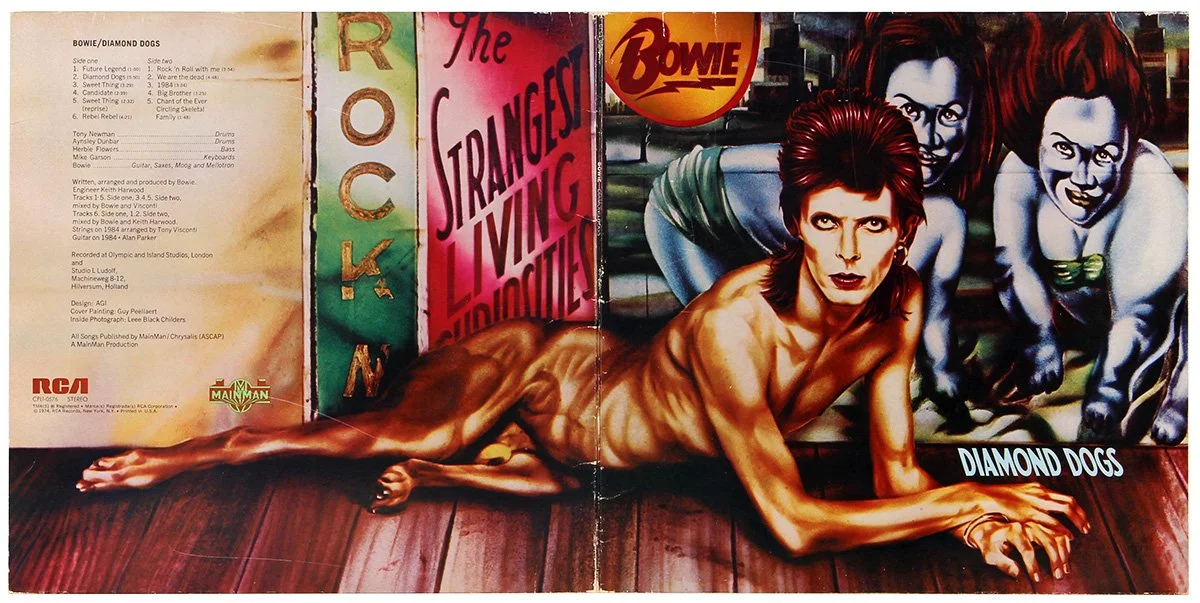David Bowie’s Diamond Dog Disaster?
David Bowie – Diamond Dog Disaster?
On May 24, 1974, David Bowie unveiled his eighth studio album, 'Diamond Dogs,' marking a significant milestone in his illustrious career. This album soared to the top of the UK charts, securing Bowie his third No.1 album and reigning supreme for a remarkable four-week period. 'Diamond Dogs' emerged after Bowie's previous works, 'Aladdin Sane' and 'Pin-ups,' which left some listeners yearning for a more cohesive musical journey. In his initial review, Rolling Stone's Ken Emerson expressed disappointment, calling it Bowie's "worst album in six years." However, nearly five decades later, it's clear that history has been kinder to Bowie's bold experimentations.
While 'Diamond Dogs' may have faced initial skepticism, it harbors undeniable brilliance. This album marked a turning point for Bowie as it was the first record since the departure of Mark Ronson, which prompted Bowie himself to take up lead guitar duties. However, the album saw Tony Visconti's return, who handled the production. Within this sonic tapestry, 'Diamond Dogs' weaves together several ambitious projects that occupied Bowie's mind at the time—a shelved Ziggy Stardust musical from 1972, an envisioned adaptation of George Orwell's 'Nineteen Eighty-Four' novel published in 1949, and an urban apocalyptic vision inspired by the writings of William S. Burroughs.
Diamond Dogs Promotional Advertisment
David Bowie's 'Diamond Dogs' arrived on the music scene propelled by the infectious energy of its lead single, "Rebel Rebel." The album swiftly ascended to the top of the charts, reaching number one in the UK and a respectable number five in the US. Since its release, 'Diamond Dogs' has sparked a range of opinions from critics, with some faulting its perceived lack of cohesiveness. However, Bowie's biographers recognize it as one of his finest artistic accomplishments. In fact, in 2013, NME esteemed it as one of the greatest albums ever.
Diamond Dog - Advertisement
Looking back, 'Diamond Dogs' has proven to be a significant cultural force, with its influence extending beyond its initial release. It is often cited as an inspiration for the punk revolution that followed in the years after its debut. Recognizing its enduring significance, 'Diamond Dogs' has been reissued multiple times, with the more recent notable remastering in 2016 as part of the comprehensive 'Who Can I Be Now? (1974–1976)' box set.
At the album's heart lies the titular track, serving as a gateway to a new persona introduced by Bowie—Halloween Jack. This enigmatic character adds a layer of intrigue to the immersive musical experience, embodying Bowie's restless spirit of reinvention. Belgian artist Guy Peellaert crafted the mesmerizing cover artwork, capturing Bowie's metamorphosis into a captivating hybrid creature—a fusion of man and dog. Photographer Terry O'Neill's skillfully captured images were the foundation for Peellaert's provocative creation, ultimately earning both acclaim and controversy.
David Bowie - Terry O’Neill - Diamond Dog Promotional Ad
'Diamond Dogs' embodies Bowie's unyielding ability to push artistic boundaries and defy categorization. It stands as a testament to his perpetual quest for innovation and exploration. The album masterfully blends ambitious concepts, musical experimentation, and visual aesthetics, creating a captivating tapestry of sound and vision.
Noteworthy for its distinct cover art, 'Diamond Dogs' immediately captured the attention and courted controversy. The original artwork depicted the hybrid creature, including its genitalia. However, in light of its explicit nature, only a few copies featuring the complete painting were released, likely influenced by concerns over public reception and potential censorship.
Despite the initial controversy, 'Diamond Dogs' ultimately garnered critical acclaim and resonated deeply with Bowie's devoted fanbase. It showcased his artistic evolution, melding glam rock, soul, and themes of dystopia and apocalypse. Tracks like "Rebel Rebel" and the eponymous "Diamond Dogs" have etched themselves into Bowie's iconic discography.
Over the years, 'Diamond Dogs' cover art has become a cherished symbol of Bowie's audacious artistic expression and willingness to challenge conventions. With its striking imagery and provocative nature, the original cover has become a sought-after collector's item, further adding to the album's legendary status in the annals of music history.
The release of 'Diamond Dogs' in 1974 solidified David Bowie's standing as a trailblazing artist, ceaselessly pushing artistic boundaries and defying societal norms. It's success and lasting legacy cemented Bowie's place as one of the most influential and innovative musicians of his era, forever leaving an indelible mark on the world of music.
- Siege VV





